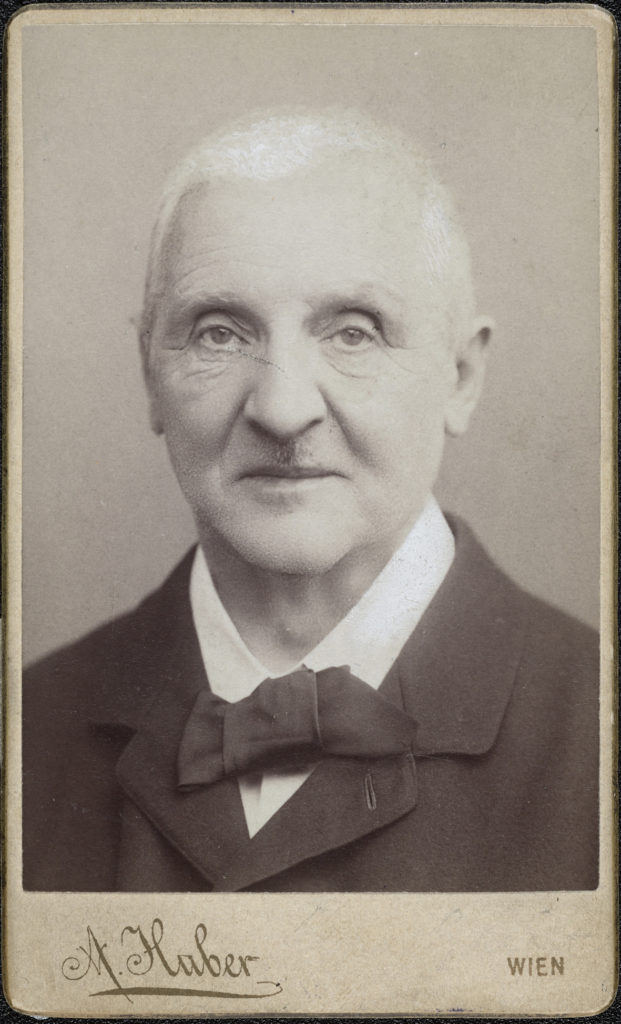
Bruckner, whose 199th birthday was celebrated in yesterday’s Music History Monday post, was born in the Austrian village of Ansfelden, near Linz. His father – Anton Senior – was the town schoolmaster and the church organist, and it was at the local Catholic Church that Bruckner heard his first music, sang as a choirboy, and learned to play the violin and organ from his father.
Bruckner was educated in the churches and monasteries of his native Upper Austria, and for his entire life, the Catholic Church was Bruckner’s spiritual home, his refuge, and his inspiration. Bruckner was as devout as they come, and he seemed to have believed completely that everything he did should honor God. Bruckner’s faith in his god might have been exactly what it appeared to be: religious altruism. But knowing the guy as we do, it’s also difficult not to see that faith as a compensation for his pathological lack of faith in himself.
As a young adult, despite his musical training and obvious talents as a musician, he apparently had little belief in his own abilities. The consensus today is that as a young man Bruckner lacked the confidence or the grit to brave the hazards of a career in music. So instead, he sought out the same sort of jobs his father had held: that of a provincial schoolteacher and part-time organist.
And that’s what he did, living, teaching, composing, and playing the organ in almost total obscurity, and taking correspondence courses in harmony and counterpoint, most notably with Simon Sechter (1788-1867) – a professor at the Vienna Conservatory – from 1855-1861.
To call Bruckner a “dedicated” correspondence student is a massive understatement; “fanatical” would be a more accurate word. His lack of self-confidence led him to follow blindly anyone he considered to be an authority figure. So when his correspondence professor Simon Sechter demanded – as he did with all of his students – that Bruckner do no free composing while pursuing his course of study, Brucker actually complied. For six years – from the age of 31 to 37 – Bruckner, obedient to a fault, composed nothing.
In 1861, Bruckner completed his course of study with Sechter. He travelled Vienna, there to apply for a diploma that would allow him to teach harmony and counterpoint in music academies.
The climax of Bruckner’s examination in Vienna was his improvisation of an organ fugue based on a theme submitted by the examining committee. After Bruckner had finished, a member of the committee – Johann Ritter von Herbeck (1831-1877), the conductor of the concerts of the Viennese Friends of Music and a faculty member at the Vienna Conservatory – said for the record:
“He should have examined us! If I knew one tenth of what he knows, I’d be happy!”
The Influence of Richard Wagner (1813-1883)

Having received his teaching diploma in Vienna, Bruckner headed back home to Linz – where he had been teaching since 1855 – and continued to take correspondence courses in orchestration and musical form. Talk about a professional student! This guy was a self-help publisher’s best friend, and so he was technically primed and ready when, in February of 1863. at the age of 38, he heard the piece of music that was his great epiphany: Wagner’s opera Tannhäuser.
In Tannhäuser, Anton Bruckner heard two things that rocked his world. First, he heard music that enthralled him like nothing he’d ever heard before, and second, he realized that many of the melodic, polyphonic, harmonic, and orchestrational aspects that so knocked him out were enthralling just because they broke the rules he had so assiduously studied in his correspondence courses!…
Continue reading – and listen to examples – on Patreon!
Become a Patron!